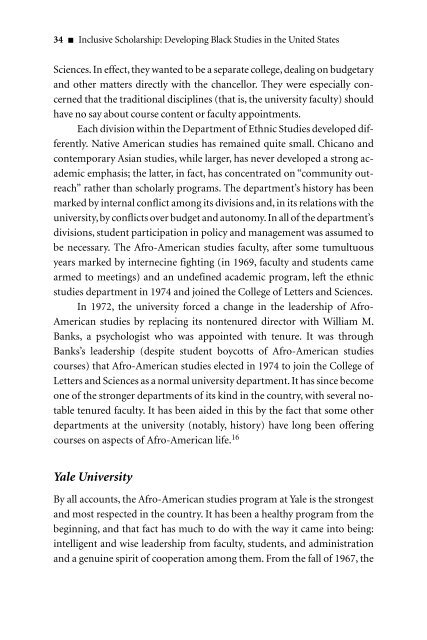Inclusive Scholarship: Developing Black Studies - Ford Foundation
Inclusive Scholarship: Developing Black Studies - Ford Foundation
Inclusive Scholarship: Developing Black Studies - Ford Foundation
You also want an ePaper? Increase the reach of your titles
YUMPU automatically turns print PDFs into web optimized ePapers that Google loves.
34 <strong>Inclusive</strong> <strong>Scholarship</strong>: <strong>Developing</strong> <strong>Black</strong> <strong>Studies</strong> in the United States<br />
Sciences. In effect, they wanted to be a separate college, dealing on budgetary<br />
and other matters directly with the chancellor. They were especially concerned<br />
that the traditional disciplines (that is, the university faculty) should<br />
have no say about course content or faculty appointments.<br />
Each division within the Department of Ethnic <strong>Studies</strong> developed differently.<br />
Native American studies has remained quite small. Chicano and<br />
contemporary Asian studies, while larger, has never developed a strong academic<br />
emphasis; the latter, in fact, has concentrated on “community outreach”<br />
rather than scholarly programs. The department’s history has been<br />
marked by internal conflict among its divisions and, in its relations with the<br />
university, by conflicts over budget and autonomy. In all of the department’s<br />
divisions, student participation in policy and management was assumed to<br />
be necessary. The Afro-American studies faculty, after some tumultuous<br />
years marked by internecine fighting (in 1969, faculty and students came<br />
armed to meetings) and an undefined academic program, left the ethnic<br />
studies department in 1974 and joined the College of Letters and Sciences.<br />
In 1972, the university forced a change in the leadership of Afro-<br />
American studies by replacing its nontenured director with William M.<br />
Banks, a psychologist who was appointed with tenure. It was through<br />
Banks’s leadership (despite student boycotts of Afro-American studies<br />
courses) that Afro-American studies elected in 1974 to join the College of<br />
Letters and Sciences as a normal university department. It has since become<br />
one of the stronger departments of its kind in the country, with several notable<br />
tenured faculty. It has been aided in this by the fact that some other<br />
departments at the university (notably, history) have long been offering<br />
courses on aspects of Afro-American life. 16<br />
Yale University<br />
By all accounts, the Afro-American studies program at Yale is the strongest<br />
and most respected in the country. It has been a healthy program from the<br />
beginning, and that fact has much to do with the way it came into being:<br />
intelligent and wise leadership from faculty, students, and administration<br />
and a genuine spirit of cooperation among them. From the fall of 1967, the

















